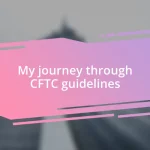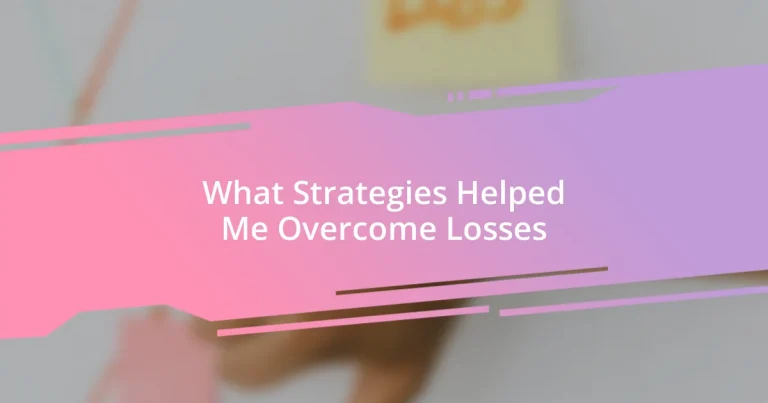Key takeaways:
- Acknowledging and embracing emotions, such as sadness and anger, is crucial for navigating grief and fostering personal growth.
- Developing a proactive coping plan with strategies like journaling, support networks, and self-care can facilitate healing and provide structure during challenging times.
- Reflecting on personal growth and celebrating small victories helps cultivate resilience and gratitude, ultimately transforming pain into a narrative of empowerment.
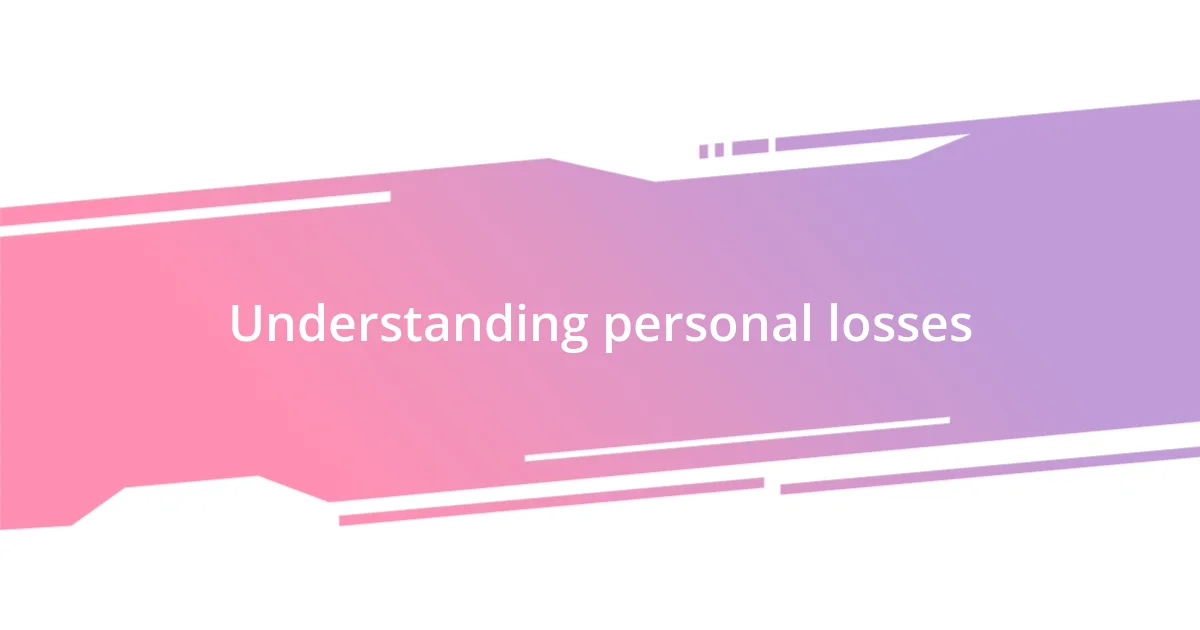
Understanding personal losses
Understanding personal losses can be incredibly complex. I remember the day I lost a loved one; it felt as if a huge void had opened up inside me. I often ask myself, how could something so profound change my perspective on life?
When faced with loss, it’s natural to experience a range of emotions—from sadness and anger to confusion. I found myself wandering through memories, grappling with the “what ifs” and “if onlys.” Have you ever questioned what life could have been like had you taken different paths? It’s these reflections that often bring both pain and clarity.
As I navigated my grief, I realized that acknowledging my loss was crucial. I learned that suppressing those feelings only delayed the healing process. Perhaps it’s in embracing our vulnerability that we truly start to understand the depths of our losses and, in turn, spawn growth from our pain.
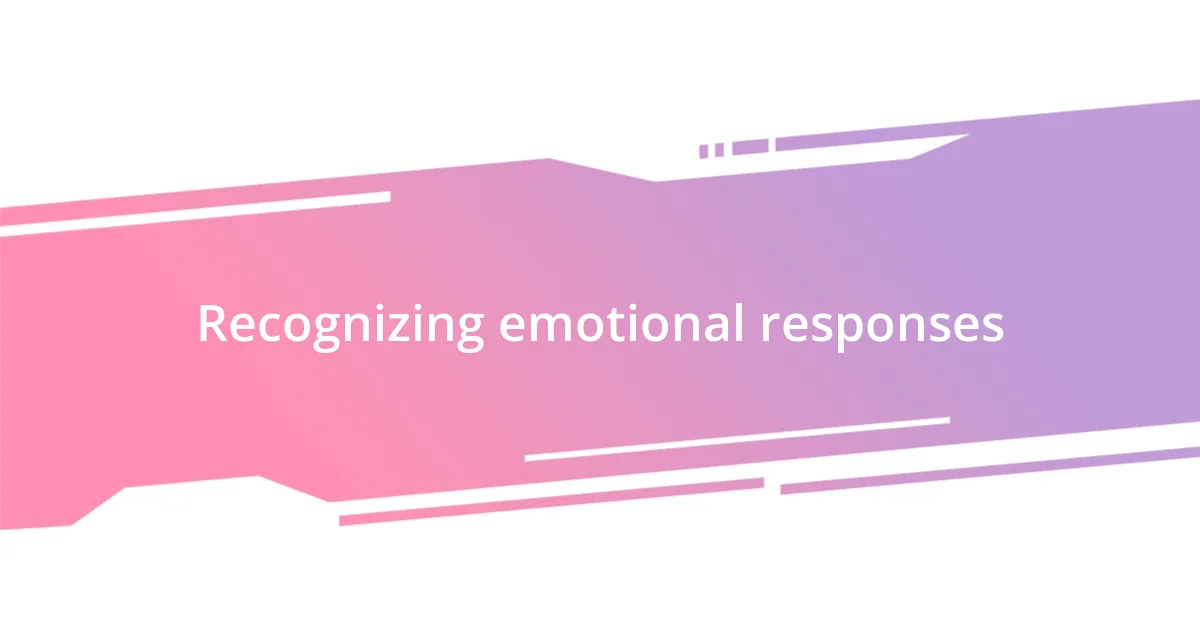
Recognizing emotional responses
Recognizing my emotional responses was a pivotal moment in my journey. One day, while sitting alone with a cup of tea, I felt an unexpected wave of anger wash over me. I realized that this anger was a mask for my sadness—a realization that turned my world upside down. It was uncomfortable but necessary to confront those feelings rather than dismiss them. Have you ever felt an emotion that seemed out of place? Grasping the relationship between my anger and my deeper sorrow helped me understand my inner turmoil.
There were times when I experienced guilt intertwined with my grief. I recall sitting with friends who supported me, yet I couldn’t shake the feeling that I should be “over it” by now. This guilt started to gnaw at me, causing shame for feeling as I did. Eventually, I recognized that these emotional responses were completely valid. Each reaction was a part of my unique journey, and it reminded me that healing isn’t linear, nor should it be rushed.
I’ve noticed that labeling emotions has helped me process them effectively. Keeping a journal, I would write down what I felt each day, often discovering patterns that revealed deeper insights. For instance, when I named a feeling, like “anxiety” or “nostalgia,” I suddenly saw it in a different light. It became clear that acknowledging these emotions not only provided clarity but also empowered me to move through them rather than being trapped by them.
| Emotion | Recognizing the Response |
|---|---|
| Anger | Realizing it masked deeper sadness |
| Guilt | Understanding it’s okay to grieve |
| Anxiety | Acknowledging it leads to clarity |
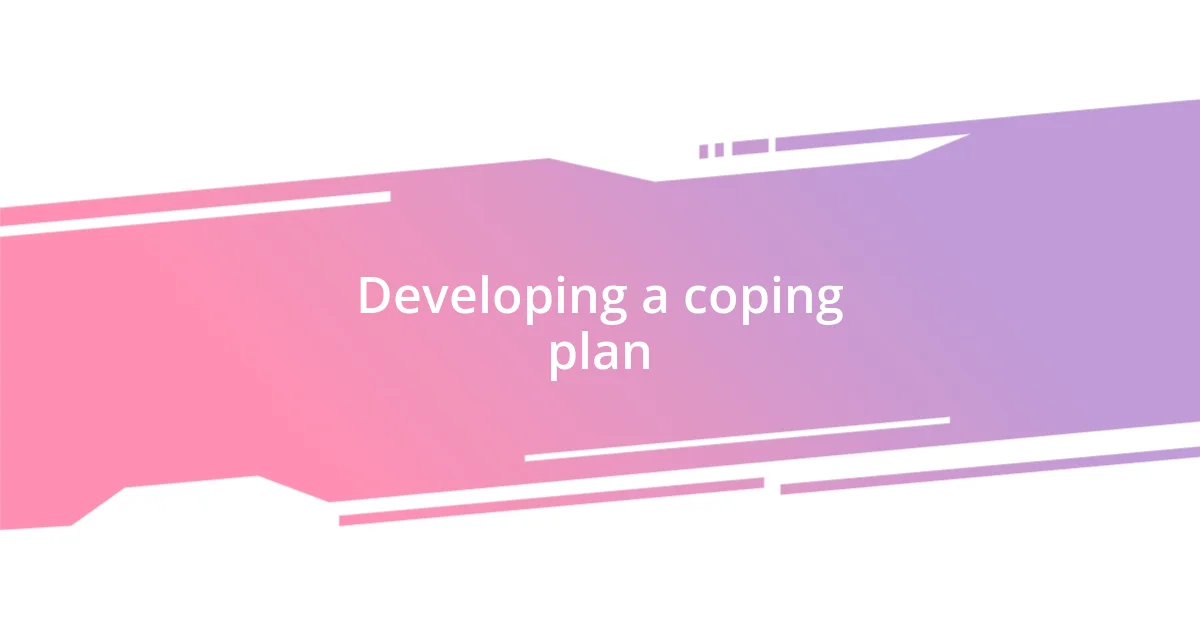
Developing a coping plan
Developing a coping plan was essential in my journey through grief. I remember feeling overwhelmed by the emotional weight of loss, so I took a proactive approach. Crafting a plan allowed me to navigate through my feelings more effectively and provided a structure to my healing journey. Have you ever found comfort in having a roadmap during turbulent times? I started by identifying specific strategies that resonated with me.
Here are some strategies I incorporated into my coping plan:
- Daily Journaling: I wrote down my thoughts and feelings, uncovering patterns and revealing what I truly needed each day.
- Scheduled “Grief Breaks”: I allocated time for myself to simply feel—whether that meant crying, reminiscing, or even laughing at a cherished memory.
- Support Network: I reached out to friends and family. Having someone to talk to made the loneliness feel less isolating.
- Physical Activity: Incorporating walks into my routine helped me process emotions through movement—a little endorphin boost never hurt.
- Mindfulness Practices: I practiced meditation to center myself, embracing the present while acknowledging my grief.
I can’t stress enough how important it was for me to adapt this plan continually. Just like a road trip, my emotional path had unexpected detours, and I learned to pivot my strategies as needed. Acknowledging that it was okay to revise my approach allowed me to grow and heal in an organic way. Sometimes, just being gentle with myself was the best strategy of all.
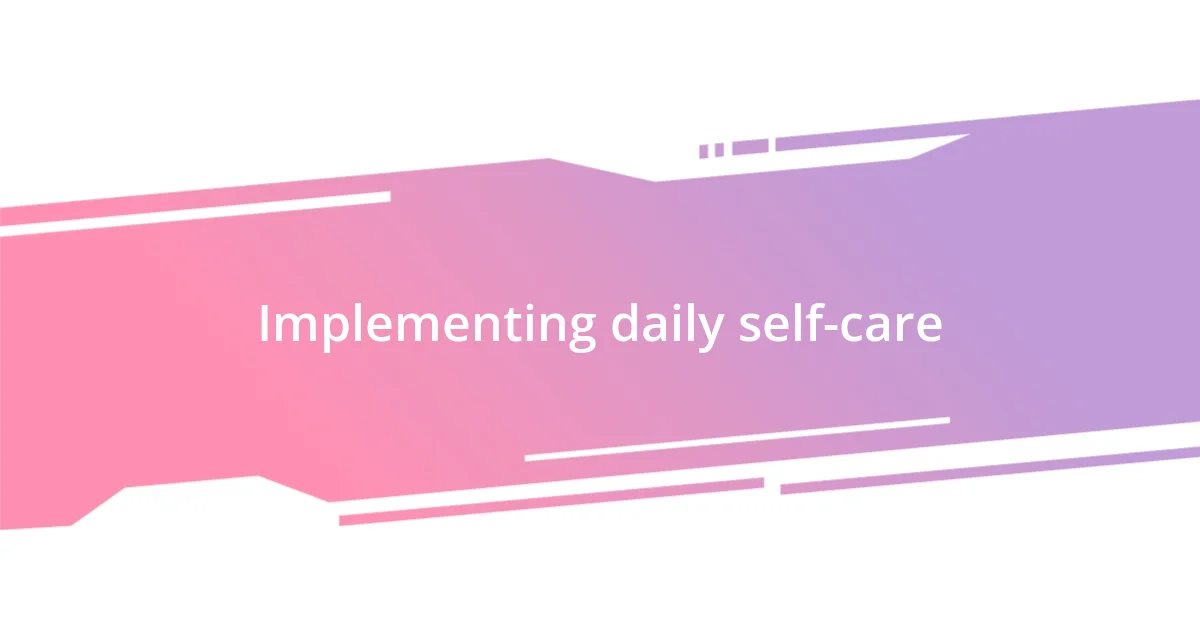
Implementing daily self-care
Implementing daily self-care became a cornerstone of my healing process. I vividly remember a period when the weight of my losses felt unbearable. Every morning, I made it a point to set aside at least 15 minutes just for myself—whether for a calming cup of herbal tea or a few stretches to shake off the heaviness of grief. This small ritual transformed my mornings from chaotic to contemplative, helping me face the day with a renewed mindset. Have you ever noticed how a simple pause can shift your entire day?
On some days, self-care looked like long walks in nature, where I’d let my mind wander freely. There were moments I found myself recognizing the beauty around me—the rustle of leaves, the chirping birds—and it made me reflect on the vibrant life that still existed despite my sadness. Engaging with the natural world often reminded me that life continues to unfold, and I was a part of that cycle. It was during these walks that I learned to embrace silent moments, allowing my thoughts to drift without urgency, as if inviting my emotions to flow naturally.
I also discovered the power of creative expression in my daily self-care routine. One evening, I picked up a paintbrush for the first time in years. Guided by emotion rather than technique, I poured my feelings onto the canvas, each stroke liberating remnants of grief I hadn’t yet processed. This creative outlet became my sanctuary, a place where colors spoke louder than words ever could. Have you found a form of expression that helps you navigate your emotions? For me, it was a transformative experience that brought back a sense of vitality and joy in the midst of my sorrow.
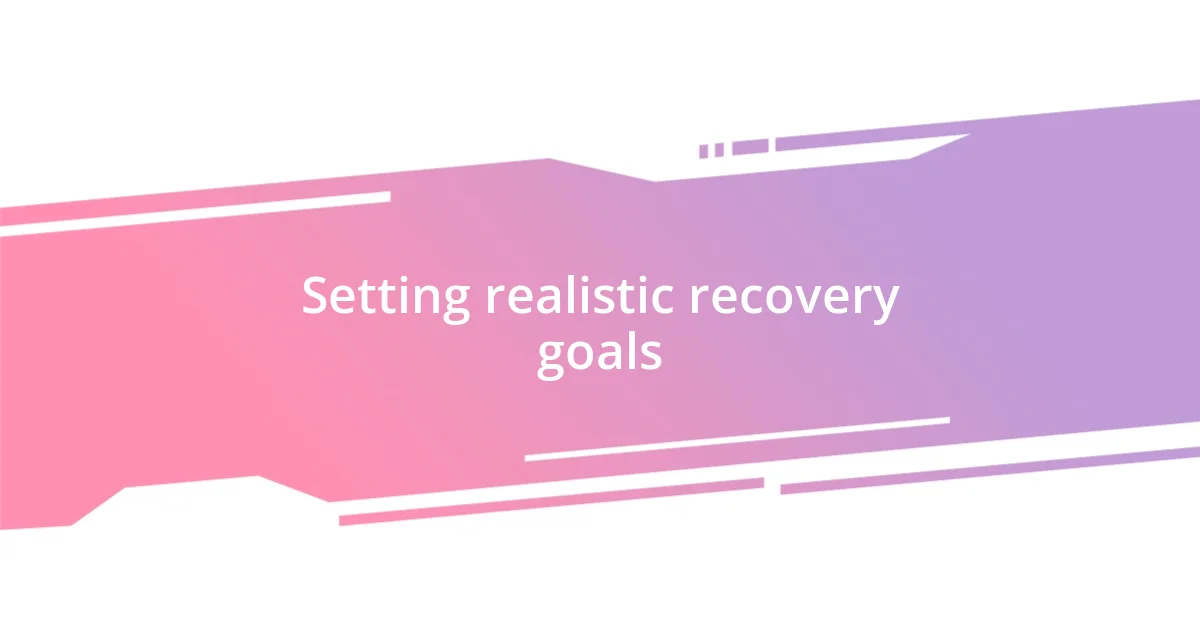
Setting realistic recovery goals
Setting realistic recovery goals was a vital step in my healing process. Instead of aiming for immediate happiness, I started with smaller, achievable objectives that felt manageable amidst my grief. For instance, I committed to simply getting out of bed each morning and taking a shower. Have you ever felt like celebrating the small victories? They can create momentum for larger changes down the line.
I remember one particularly tough week when even those small goals felt daunting. In response, I recalibrated my expectations to focus on what I could realistically handle. I set a goal to share a meal with a friend once a week—nothing extravagant, just a comforting dinner. Not only did this encourage social interaction, but it also made me feel less isolated while offering moments of joy that felt achievable in my current state. How often do we forget the power of companionship during tough times?
Importantly, I learned to celebrate each step forward, no matter how minor it seemed. Tracking my most basic achievements in a notebook became a reminder that recovery isn’t a race; it’s a journey. I would jot down daily reflections like “Today, I made my favorite breakfast” or “I reached out to a friend.” Each entry reinforced the idea that progress can come in many forms, and recognizing those milestones kept me motivated on days when I felt stagnant. Have you ever taken a moment to acknowledge your own strides, no matter how small? It can shift your perspective, encouraging a kinder view of your healing path.
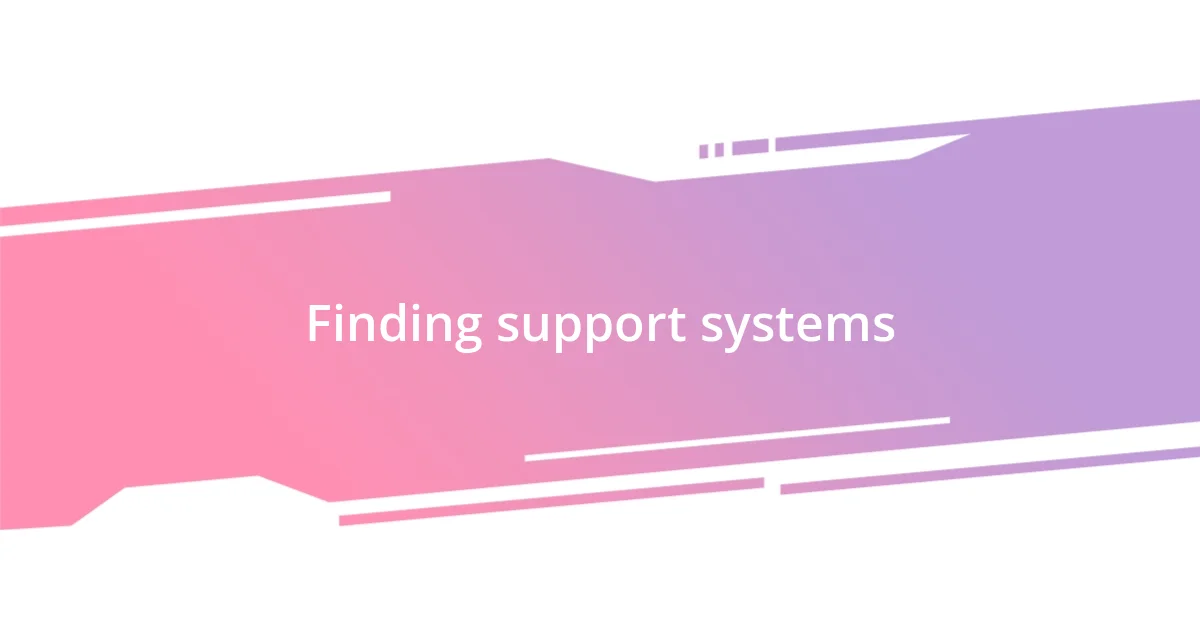
Finding support systems
Finding a support system was essential in navigating my losses. I journeyed through a wave of emotions that sometimes felt isolating, but reaching out to friends and family opened doors I didn’t know existed. One evening, while sharing a simple dinner with a close friend, I discovered how vital it was just to talk things out. Have you experienced that comforting relief when someone lends an ear, allowing your feelings to flow freely?
In moments when solitude loomed large, I leaned on online communities, where strangers became pivotal support figures. I vividly recall one night, feeling particularly overwhelmed, I joined a virtual support group. There, I connected with others who understood my pain, and sharing our experiences fostered a sense of belonging. What struck me was how powerful it can be to find strength in numbers, even with people I’d never met face-to-face.
Reflecting on my path, I realize the importance of surrounding myself with those who uplift and understand. During a low point, I reached out to a mentor who had faced similar challenges. Their perspective was a game-changer, reminding me that healing is nonlinear. Have you sought wisdom from someone who’s walked a similar path? Sometimes, a little guidance can light up the darkest days, offering hope that things do indeed get better.
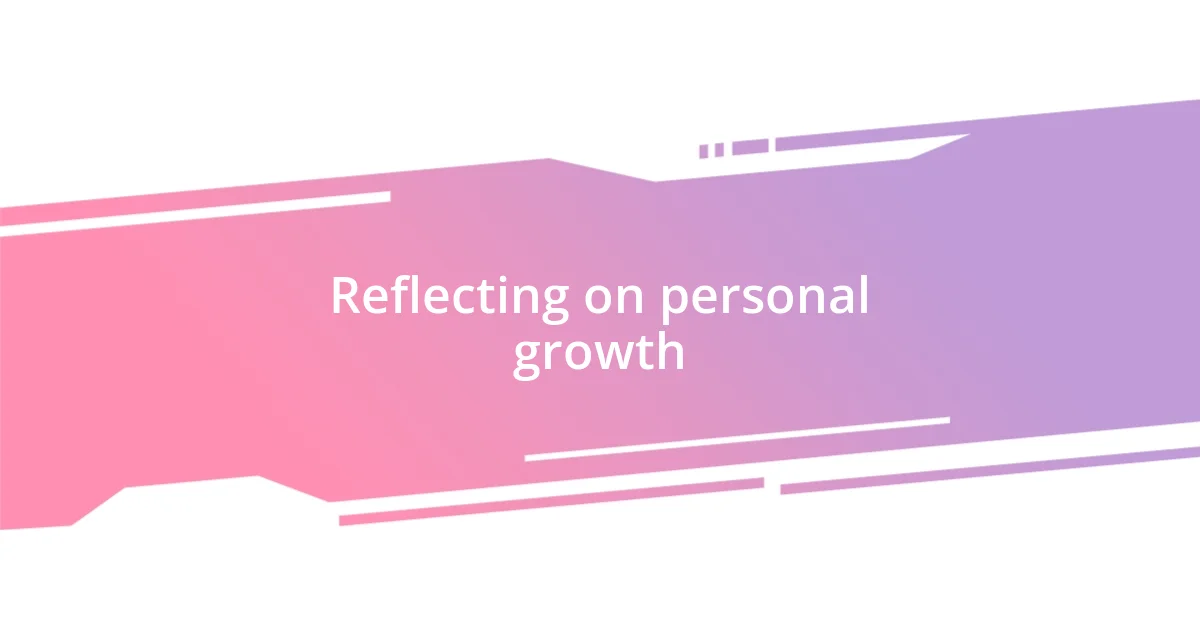
Reflecting on personal growth
Reflecting on personal growth has been an illuminating experience for me. In the days following my loss, I felt an overwhelming sense of confusion and stagnation. But looking back, I see how those painful moments propelled me into deep self-reflection. Have you ever found that your toughest times led to profound insights? I certainly did, and it prompted me to re-evaluate the way I viewed not just my challenges, but my entire life trajectory.
One transformative moment came when I began journaling my thoughts. I remember sitting with a cup of herbal tea, letting my pen flow freely across the pages. Reading my own words later helped me realize how much resilience was hidden beneath the surface. It was like piecing together a puzzle of my own strength; I discovered I could uncover silver linings even when everything felt clouded. How often do we overlook our inner fortitude during hard times? It became a practice that transformed my pain into a narrative of empowerment, allowing me to embrace my journey.
As I navigated through this period, I also learned to appreciate the lessons wrapped in loss. For instance, I developed a newfound gratitude for even the simplest experiences—like the sun warming my face during a walk or the laughter shared with a friend. It’s incredible how these small moments of joy became markers of my growth. Do you recognize the beauty in life’s little things? I found that reflecting on my progress helped me cultivate a sense of hope, even amidst heartbreak.









